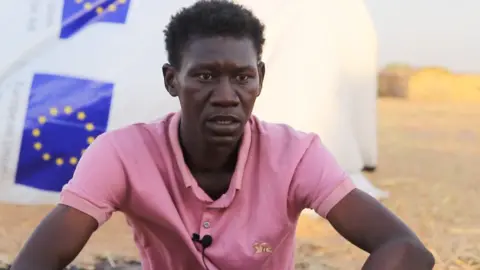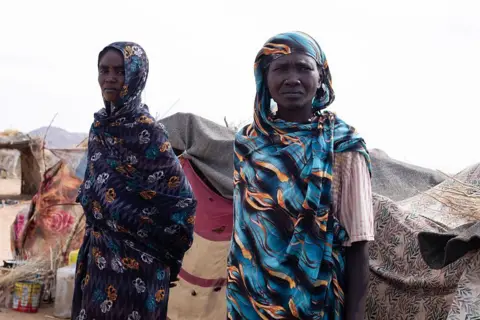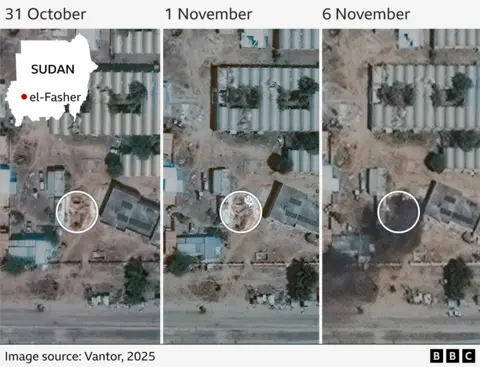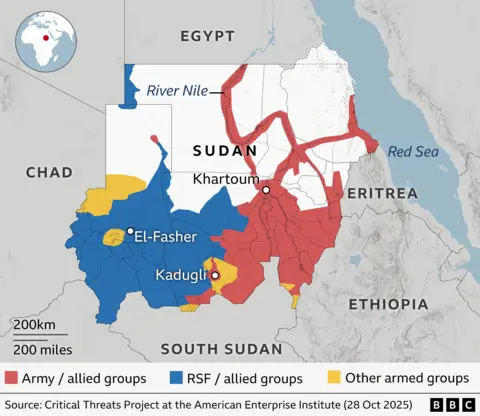Barbara Plett UsherAfrica correspondent
 BBC
BBCA man who escaped the last functioning hospital in the Sudanese city of el-Fasher before a reported massacre by paramilitary troops says he has lost all hope and happiness.
“I have lost my colleagues,” Abdu-Rabbu Ahmed, a laboratory technician at the Saudi Maternity Hospital, has told the BBC.
“I have lost the people whose faces I used to see smiling… It feels as if you lost a big part of your body or your soul.”
He has been speaking to us from a displaced persons camp in Tawila some 70km (43 miles) to the west of el-Fasher, the regional hub which was taken over by paramilitary Rapid Support Forces (RSF) in the last week of October after an 18-month siege.
The RSF has been fighting the Sudanese army since April 2023, when a power struggle between their leaders erupted into a civil war.
The alleged killings of at least 460 patients and their companions at the Saudi Hospital were one of the most shocking among widespread accounts of atrocities – some of them filmed by RSF fighters and posted to social media.
In a statement of condemnation, the World Health Organization (WHO) said it was “appalled and deeply shocked” by the reported shootings, and by the abductions of six health workers – four doctors, a nurse and a pharmacist.
The RSF has dismissed the accusations as disinformation, declaring that all of el-Fasher’s hospitals had been abandoned. It disputed the claims by filming a video inside the hospital grounds showing female volunteers tending to patients.
A freelancer based in Tawila gathered interviews for the BBC.
Mr Ahmed told him he had carried on working at Saudi Hospital since the beginning of the war, despite regular shelling by artillery, tanks and drones – which destroyed parts of the buildings and injured doctors and nurses as well as patients.
Medical staff used to share what little food was available as the RSF blockade tightened, he said, sometimes working without breakfast or lunch.
Most of them fled when the paramilitary fighters launched their final assault.
 AFP via Getty Images
AFP via Getty Images“The shelling started around six in the morning,” Mr Ahmed said.
“All civilians and soldiers headed out towards the southern side. There was a state of terror, and as we walked, drones were bombing us. And heavy artillery too – I saw many people die on the spot, there was no-one who could save them.”
Mr Ahmed said some of the fleeing medical workers arrived with him in Tawila, but many were detained in locations north-west of the city, naming the Garni area, the villages of Turra and Hilla al-Sheikh and the town of Korma.
Some were transferred to Nyala, he said, the RSF’s de facto capital in South Darfur.
“This is the information I received from colleagues we know,” he told the BBC, saying that he later heard medical staff who remained at the hospital were executed.
Mr Ahmed also lost much of his family: a sister and two brothers were killed that day, and his parents are missing.
“I am very worried about the fate of the people inside el-Fasher,” he added.
“They may be killed. And they may be used as human shields against the [Sudanese air force] airstrikes.”
Accounts of the alleged hospital massacre were reported by two Sudanese doctors’ groups, citing sources on the ground, and an el-Fasher activist network.
Yale University’s Humanitarian Research Lab said satellite imagery corroborated the reports, apparently showing blood on the ground and white grouped objects that looked like bodies in the hospital compound.
In a satellite image from 1 November, the white objects are seen being placed at an area that had been dug within the compound of the hospital. In a subsequent one, taken on 6 November, these objects are seen charred and with smoke still rising from the area.

BBC Verify has authenticated footage filmed at the nearby University of El-Fasher’s Faculty of Medical Laboratory Sciences: it shows bodies lying on the floor and an RSF fighter shooting one of the men still alive.
A spokesman for the Sudan Doctors Network, Dr Mohamed Elsheikh, told the BBC this building was being used as an extension to the Saudi hospital for wards and patients.
He went on to explain that the RSF had been demanding ransoms for the release of the abducted health workers.
“The six kidnapped doctors or medical staff, one of them, his family, managed to pay the ransom equivalent to $30,000 [£23,000], and he arrived safely to Tawila town,” said Dr Elsheikh, now an NHS doctor in the UK.
“The other was executed,” he added, saying the group has no information on the fate of the remaining four.
Back in Tawila, Mohamed Abdu-Teia, who had been a patient at the Saudi Hospital when the RSF closed in, can do little else but lay on the ground with his leg in a tattered cast.
It was broken in a shelling attack, he tells the BBC, but he managed to flee the city on foot the morning of the final RSF assault.
Like many other men suspected of being soldiers, Mr Abdu-Teia was stopped at the Garni checkpoint and interrogated, he says. The two men with him were taken, but the RSF let him go.
“They didn’t beat me, but they questioned me a lot, because of my injury, I think. They said: ‘We know you are a soldier, but you’re finished – you will die on the road. So just go.”
Mr Abdu-Teia says the RSF brought some medicine to Garni but “the injuries were too many – two or three people died every hour.
“The same day we arrived, vehicles came and took people to unknown places. Any young man who looked physically OK was taken.”
He managed to get a lift to Tawila from “people who had cars”. They charged passengers 500,000 Sudanese pounds ($830, £630) and turned on wi-fi hotspots so they could call their families to transfer money, he said. “We left with them – we had nothing, not even plans.”
Many children arrived at the Tawila camps without parents. Fifteen-year-old Eman was one of them.
Her father was killed in a drone strike in el-Fasher, she told the BBC, and her mother and brother were detained by the RSF as they fled.
“Whoever did not die, [the RSF] ran them over with vehicles,” she said. “They took our belongings and told us all of you are soldiers. They beat my brother and choked him with a chain.
“They wanted to beat my mother. She told us: ‘Go, I will come to you.’ We got into a vehicle and left. They did not allow my brother to get into the vehicle. We left them behind.”
Eman escaped but saw other girls and women who did not.
“They took some women. They took them in their vehicles and stabbed some of them with knives. Some were taken while their mothers couldn’t do anything.”
Female survivors have told horrific stories of gang rapes and the abduction of young girls.
Another teenager on her own, 14-year-old Samar, said she had lost her mother in the chaos at the Garni checkpoint, and her father was arrested.
She was told he was taken to the Children’s Hospital in el-Fasher.
That building had reportedly been serving as an RSF detention centre, and it is where the Yale researchers also said satellite images showed evidence of killings: apparent clusters of bodies as well as earth excavations that could have been a mass grave.
The RSF has issued videos to counter these allegations, declaring that the Children’s Hospital in el-Fasher is ready to receive patients.
One shows a man dressed in a blazer standing outside its gate with a group of what appear to be doctors in hospital scrubs.
“These medical personnel and cadres, they are not hostages,” the man in the blazer says. “We are not taking them as war hostages. They are free. They are free to practise medicine.”
Another man in the video, who introduces himself as Dr Ishaq Abdul Mahmoud, associate professor of paediatrics and child health at el-Fasher University, says: “We are here to help any person in need of medical service.
“We are out of politics. Whether soldiers or [civilians] we are ready to help them.”
Dr Elsheikh of the Sudan Doctors Network dismisses the RSF videos as propaganda.
And Mr Ahmed, the Saudi Hospital laboratory technician in Tawila, knows what he has seen, and he has seen too much.
“I do not have any hope of returning to el-Fasher,” he says.
“After everything that happened and everything I saw. Even if there was a small hope, I remember what happened in front of me.”
Additional reporting by BBC Verify’s Peter Mwai

More BBC stories on the Sudan crisis:
 Getty Images/BBC
Getty Images/BBC
